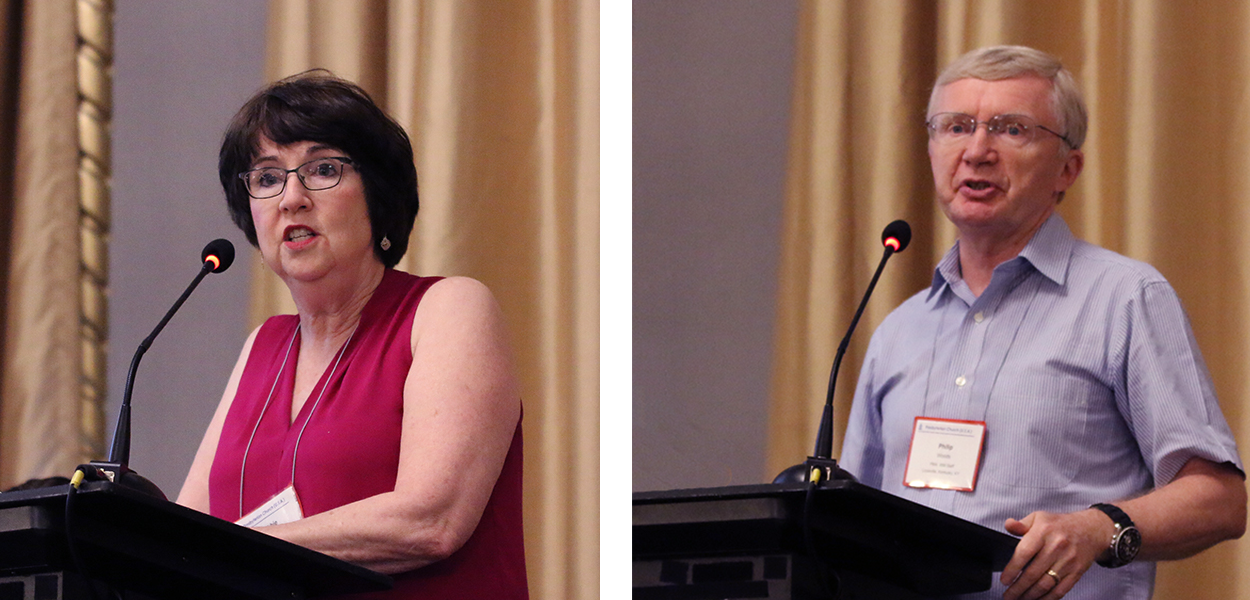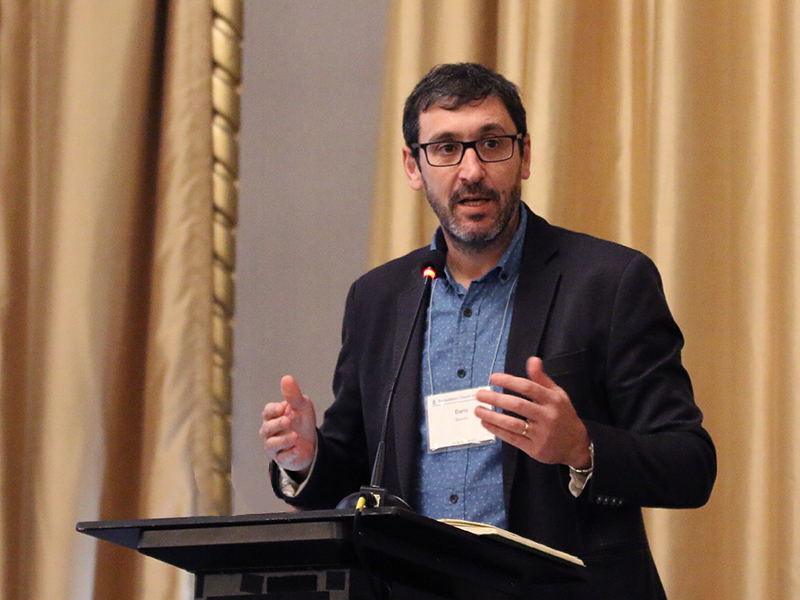
Rev. Debbie Braaksma, coordinator of World Mission’s Africa office, and Rev. Philip Woods, World Mission’s associate director for strategy, program and recruitment, introduce the process in development of World Mission's strategic plan at the World Mission luncheon at Big Tent on Friday. Photos by Angela Stevens
Presbyterian World Mission reported the progress of its strategic consultation process Friday to more than 200 gathered at its Big Tent luncheon.
World Mission began the process in the fall of 2018 to gather input from across the world in the development of a new strategic plan. The process was led by Rev. Philip Woods, World Mission’s associate director for strategy, program and recruitment, and the Rev. Debbie Braaksma, coordinator of World Mission’s Africa office.
In introducing the process to the assembled gathering, Braaksma said World Missions’ last strategic plan was formulated a decade ago and there was a need for a fresh reading of the signs in a rapidly changing geo-political and religious context.
“True to our deep commitment to doing mission in partnership, as we live our calling to be a Matthew 25 church, World Mission designed a process which enabled it to deeply listen to international partners and domestic constituents and colleagues,” Braaksma said.
She explained there were 10 consultations in 10 months with over 500 participants and 250 global partners. Consultations featured a of balance men and women, and 43 percent of participants were people of color. There were also opportunities for colleagues from across PC(USA) to offer input.
After nearly 18 months of gathering insight, World Mission’s strategic planning table began to pore through 300 pages of notes, “a vast witness of insight and wisdom and experience into what it means to be God’s partner in mission,” said Woods. The group also turned to PMA’s Research Services Group to analyze and look for themes which produced a report that ran more than 40 pages.
Woods said the strategy table sat down about two weeks ago to reflect on the information.
“Not surprisingly, there were no simple conclusions,” he said. “One of the things which had become clear to us during the process was, although it was called a strategy process, the richness of what we were hearing meant that we would not be producing a normal strategic blueprint. At best, we would be able to identify the main themes which we need to be addressing at this point in time as we seek to reposition the Presbyterian Church (U.S.A.) in its partnerships in God’s mission for this time.”
Both Braaksma and Woods, who participated in every consultation, said the responses were very rich and provided World Mission with a wealth of material to consider in the development of a future vision for World Mission.

Dario Barolin, executive director of the Alliance of Latin American Reformed and Presbyterian Churches, speaks at the World Mission luncheon at Big Tent on Friday. Photo by Angela Stevens
Dario Barolin, executive secretary of the Alliance of Latin American Reformed and Presbyterian churches and pastor of the Waldensian Church, spoke from the partner perspective about the consultation process. He told the story of a woodcutter who wasted time and energy by cutting wood with a dull blade. He said there was no time to stop and sharpen it. “These consultations were a time to stop and sharpen the blade,” he said, “and I was very pleased to be part of the process.”
Woods talked about the outcomes of the process and the similarities and common themes among global partners and U.S. Presbyterians.
He said the strategy table has identified some common themes that require a deeper look moving forward, including missiology, partnership and mutuality, our Matthew 25 vision and our global engagement, colonialism and its impacts past and present, the content of World Mission’s work and the acquisition of resources.
“Only when we have wrestled with these other questions can we begin to think about the content of World Mission’s work,” he said. “These are challenges which await us as we begin to dig deeply into what will lead us into a major repositioning of our work.”
Rev. Jose Luis Casal, the director of World Mission who has been instrumental in driving the consultations, was the last luncheon speaker. He said, “We have to deconstruct the way we do mission so that we can reconstruct mission in a new way. We do mission, not in charity, but in solidarity. That only happens over time. That is what creates friendships and relationships built on mutual respect.”
